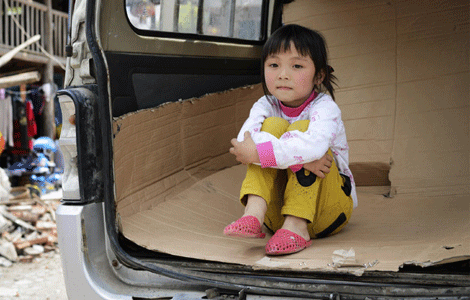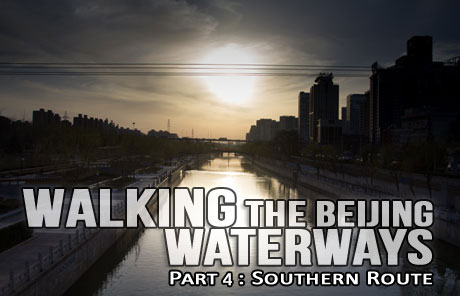Can earthquakes be predicted?
Updated: 2013-04-30 07:29
(chinadaily.com.cn)
|
||||||||
The Lushan earthquake that occurred on April 20 in Southwest China's Sichuan province has people asking the age-old question: Can earthquakes be predicted? If not, are there any warning signs, any unusual occurrences that suggest an earthquake is on the way? The People's Daily reports.
Q: Is it possible to predict an earthquake?
A: Experts from Japan, the Chinese mainland and Taiwan generally agree that earthquakes cannot be accurately predicted and forecasts are always proved wrong.
According to the Japan Meteorological Agency, given the current level of science and technology, earthquakes are very difficult - if not impossible - to predict with any accuracy.
Shinichi Sakai, a researcher at Tokyo University's Earthquake Research Institute, said, "We not only do research to estimate the possible time, site and magnitude of a potential earthquake by analyzing the seismic activity and other seismic precursors, but we also study the reasons and conditions of an earthquake and the possible problems may arise from it."
"Experts generally think earthquakes cannot be forecast at present," said Lu Wensheng, a professor from the Institute of Structural Engineering and Disaster Prevention at Shanghai's Tongji University.
"According to plate tectonic theory, an earthquake occurs when the earth's crust breaks under the stress created by the constant movement and collision of the tectonic plates," Lu said. "However, movement and collisions happen constantly, so it is difficult to know when they will shape a big enough malposition to trigger an earthquake."
Chen Qunce, a researcher at the Chinese Academy of Geological Sciences explained that earthquake prediction is mainly restricted by technology at the detection level. State-of-the-art monitoring systems cannot reach the depths in the earth's crust where earthquakes are triggered. Modern science has yet to find any basic regularity to the processes that cause earthquakes.
Since earthquakes cannot be predicted, good earthquake-resistant construction is essential for houses and buildings, said Guo Kaiwen, director of the Seismological Center of Taiwan's weather bureau.
"Statistically, it is possible for someone or some agency to correctly forecast the Wenchuan, Yushu or Lushan earthquake, but there are much more incorrect predictions," says Zhao Kechang, a professor at Peking University's School of Geoscience and Space Science.
"There are numerous forecasts online every day," said Zhao. "Because of the large number of predictions, some of them now and then happen to be correct, and they are always over-hyped."
In Taiwan, earthquake predictions are not published for fear of causing public panic, according to Guo Kaiwen. "If they violate the rule, they will be warned and even fined with NT$200,000 to 1 million ($6,785 to $33,927). But their forecasts can be sent to the Seismological Center."
"There were fewer predictions before the Sept 21, 1999 earthquake in Taiwan than usual," Guo added.
China's Law of Protecting Against and Mitigating Earthquake Disasters also requires that all predictions must be reported to the local earthquake prevention department. In addition, no agencies or individuals are allowed to make earthquake predictions public.
Q: Is Earthquake early warning and earthquake prediction the same thing?
A: No. Earthquake early warning broadcasts notification after an earthquake has occurred in order to minimize possible losses.
"Earthquake early warning analyzes the difference in speed between the pressure and shear waves (P-wave and S-wave). Once sensing the P-wave, it sends out alarms on the forthcoming dangers ahead of the arrival of the S-wave, which leads to strong shaking and causes great damages. That differs from earthquake prediction," explained a staff person at the Japan Meteorological Agency (JMA).
Japan's earthquake early warning mainly refers to Earthquake Early Warning (alert). As of March 2012, Japan Meteorological Agency issues earthquake early warning alerts based on data provided by the JMA's 235 seismographs and country's 850 high-sensitivity seismic observation network built by the National Research Institute for Earth Science and Disaster Prevention. Japan is a country prone to earthquakes. Whenever people feel the earth shake they can turn on the TV and get early warning alerts from the JMA.
When a devastating earthquake hit Japan on March 11, 2011, the earthquake early warning system provided the public with eight to 30 seconds to run for safety. The 27 trains running on Tohoku Shinkansen high-speed rails stopped promptly and avoided possible derailments or worse.
Lu Wensheng said that it took more than 10 seconds for the Lushan earthquake to spread to Chengdu. If there had been warnings through channels like the Internet and radio waves, some areas might have had warning.
Li Shan said that at present there is a pilot earthquake early warning system in Fujian province consisting of 125 stations. Monitors for areas around China's capital city and Lanzhou of Gansu province are being implemented.
Guo Kaiwen said that the effectiveness of an earthquake early warning system is obvious for tsunamis. With 10 minutes warning, casualties from a tsunami could be reduced by 90 percent, he said. But Guo admits the warning system is not as good as people imagine it to be. "It does not leave enough time for people adjacent to the epicenter, and is useless for people in remote areas."
"Of course, we cannot say that it is totally useless," he added. "If there is a precision surgical procedure scheduled 100 km away, it can be put off."
Q: Is it feasible to move buildings out of the seismic zones?
A: Relocation is possible in theory only. There are so many faults in Taiwan, for instance, that it is virtually impossible to completely move out the earthquake zone.
Some netizens suggest that in order to avoid earthquakes, people should move out of seismic zones. Lu Wensheng said, "Based on our current technical capacity, it's hard to accurately point out the potential earthquake fault zones. Therefore, the reconstruction after an earthquake is mainly rehabilitation on original sites, and that is determined by a variety of social factors."
He said that an earthquake fault zone may stretch hundreds of miles and its width can range from a few kilometers to hundreds of kilometers. As in the case of the Wenchuan earthquake, the fault zone was as long as 350 km, which was the chief cause of the huge amount of losses incurred.
Guo Kaiwen said that the deadly earthquake that struck Taiwan on Sept 21, 1999, occurred in the Chelungpu fault, which was more than 100 kilometers long beneath the Taichung basin, home to millions of people.
"There are a lot of faults in Taiwan, so it is impossible to avoid all of them, and people could not simply move out for the reason of the earthquakes."
Shinichi Sakai said that for people living in the fault zones, we cannot tell them: "Please move to other places," but ask them to decide whether to relocate on their own.
Places battered by the earthquake and tsunami on March 11 in 2011 are facing risks of further disasters. But even for people in these places, it is still rests upon them whether to relocate collectively or not. The national and local government will subsidize on their relocation.
Q: Is it possible to predict earthquake by any abnormal occurrences?
A: It is difficult to prove that an abnormal occurrence before earthquake is actually related to the earthquake itself.
According to Lu Wensheng, underground water or animals could behave abnormally before earthquake, but there is no scientific evidence to back it. Sometimes professionals collect evidence of unusual phenomenon when they monitor seismographic data. However, predictions can't be made only upon the information. In-situ stress, underground temperatures and the spectral density of small earthquakes are also taken into consideration.
Are animals' abnormal behavior warning signs of an impending earthquake? Guo Kaiwen said there is an element of science to say yes. Most animals are sensitive so they may get a feeling when a fault rupture happens, which leads to an earthquake. "But you can't say an earthquake is going to happen whenever animals behave abnormally," Guo added.
Staffs from Japan Meteorological Agency said any scientific evidence linking unusual phenomena of cloud and animals to earthquakes has not been found. Changes in water from a deep well, such as muddiness, might possibly be related to an earthquake. However, changes in water from shallow wells used for drinking water have no scientific connection with earthquake.
Shinichi Sakai told reporters there are different abnormal occurrences before an earthquake happens, but it's difficult to prove these phenomena are warning signs of an earthquake.
Seismologists have yet to find a certain warning sign of an earthquake, said Zhao Kechang.
Q: What is the safest thing to do during an earthquake?
A: There is an online theory saying that it is safe to hide in the "Triangle of Life" when an earthquake happens. People in a building should seek shelter near solid items that will provide a protective space formed when the walls and roof fall. It could save lives.
Lu Wensheng insists that the Triangle of Life is not always best, it depends on the circumstances. For example, a bathroom or a kitchen should be suitable to form a Triangle of Life, according to the theory. But it is dangerous – there may be electricity leakage from electric water heaters in a bathroom, broken glass from windows or shattered mirrors, and gas may leak in a kitchen. In the magnitude-7 quake which jolted Lushan, Sichuan province, houses constructed by villagers were damaged seriously. There is no seismic fortification criteria regulation on these houses at present, so it would be difficult to find a Triangle of Life in one of them. The Japan Meteorological Agency gives several suggestions for keeping safe during an earthquake: Furniture should be fixed in a room; don't put anything that could fall over in bedroom. Know where your local earthquake shelters are. Don't panic when an earthquake happens. Protect your head. Stay away from big furniture and hide under the sturdiest table. Live in a building with a seismic design.
Most Viewed
Editor's Picks

|

|

|

|

|

|
Today's Top News
Willem-Alexander ready to be Dutch King
Can earthquakes be predicted?
City unites to say farewell
Beauties turn entrepreneurs
Small stores rely on new retail revolution
Flooding season nears in Ya'an
Taobao creates job specifications
China's oil, gas output up slightly in Q1
US Weekly

|

|














